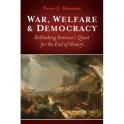Mini-Recommended Reading
While laws governing the use of interstate force bar the use of force in another nation’s territory at times of peace, under Article 51of the United Nations Charter, a nation has “the inherent right of individual or collective self-defence [sic]” until the UN Security Council takes action. Article 51 applies if either the targeted state agrees to the use of force in its territory by another nation or the targeted state, or a group operating within its territory, was responsible for an act of aggression against the targeting state.
These conditions are mutually exclusive; only one must be satisfied to justify a unilateral extraterritorial use of force by a UN Member. In the cases of Pakistan, Somalia, and Yemen, both conditions are satisfied: all three countries have consented, explicitly or otherwise, to the US operating drones within their territories, and all three are “safe havens” for groups that have launched violent attacks against the US and US interests.
If the US is well within its right to conduct drone strikes within these nations, why, then, does it not simply invoke Article 51 as a means of justification and end the legality debate?
David Brooks –Why Our Elites Stink
Brooks gets some of this wrong and drastically underestimates active vice passive corruption eating away at the system bit he gets one critical point right:
….As a result, today’s elite lacks the self-conscious leadership ethos that the racist, sexist and anti-Semitic old boys’ network did possess. If you went to Groton a century ago, you knew you were privileged. You were taught how morally precarious privilege was and how much responsibility it entailed. You were housed in a spartan 6-foot-by-9-foot cubicle to prepare you for the rigors of leadership.
The best of the WASP elites had a stewardship mentality, that they were temporary caretakers of institutions that would span generations. They cruelly ostracized people who did not live up to their codes of gentlemanly conduct and scrupulosity. They were insular and struggled with intimacy, but they did believe in restraint, reticence and service.
Today’s elite is more talented and open but lacks a self-conscious leadership code. The language of meritocracy (how to succeed) has eclipsed the language of morality (how to be virtuous). Wall Street firms, for example, now hire on the basis of youth and brains, not experience and character. Most of their problems can be traced to this.
If you read the e-mails from the Libor scandal you get the same sensation you get from reading the e-mails in so many recent scandals: these people are brats; they have no sense that they are guardians for an institution the world depends on; they have no consciousness of their larger social role.
That’s exactly correct. An elite with no ethical guidance system are not merely prone to personal vice and policy disaster, they are dangerous to democracy.
ADDENDUM:
Peter J. Munson, USMC Major, SWJ editor and…author!
Advanced Praise for War, Welfare, and Democracy

War, Welfare & Democracy: Rethinking America’s quest for the End of History by Peter J. Munson
Page 2 of 2 | Previous page